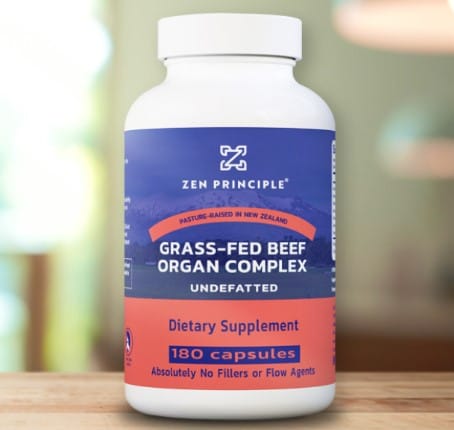Key Takeaways:
- Grass-fed beef organ supplements provide a rich source of essential nutrients that support overall health.
- Consuming organ meats can improve bone health, digestive health, and boost the immune system.
- Organ meat supplements offer a convenient way to incorporate nutrient-dense organs into your diet.
Introduction
Grass-fed beef organ supplements have gained popularity due to their numerous health benefits. These supplements are derived from the organs of grass-fed cattle, which are known to be more nutrient-dense compared to raw organs of their grain-fed counterparts. This article delves into the benefits of consuming grass-fed beef organ supplements, the nutritional value of beef organ supplement and meats, and how they can contribute to a balanced diet.
Nutritional Benefits of Grass-Fed Beef Organs

Grass-fed beef organs are packed with essential nutrients that are often lacking in muscle meats. These key nutrients include vitamins A, D, E, and K, as well as B vitamins, iron, zinc, and selenium. Organ meats offer a concentrated source of these nutrients, making them an excellent addition to any diet.
For instance, eating beef liver provides a significant amount of vitamin A, which is crucial for maintaining healthy skin, vision, and immune function. Additionally, organ meats are rich in heme iron, a type of iron that is more easily absorbed by the body compared to non-heme iron found in plant-based foods.
Bone Health and Organ Meats
Organ meats, particularly bone marrow, are beneficial for bone health. Bone marrow contains essential nutrients such as calcium, phosphorus, and collagen, which are vital for maintaining strong and healthy bones. Consuming bone marrow can help prevent conditions like osteoporosis and improve overall bone density.
Moreover, organ meats are a good source of vitamin D, which plays a crucial role in calcium absorption and bone health. Including organ meat supplements in your diet can ensure you get enough vitamin D, especially if you have limited sun exposure.
Digestive Health and Organ Meats
Organ meats are also beneficial for digestive health. They contain digestive enzymes that aid in the breakdown and absorption of nutrients. For example, eating organs like the stomach and intestines can provide enzymes that support the digestive process and improve gut health.
Additionally, organ meats are rich in glycine, an amino acid that supports the production of stomach acid and bile, both of which are essential for proper digestion. Including organ meat supplements in your diet can help improve digestive health and prevent issues like bloating and indigestion.
Immune System Support
A strong immune system is essential for overall health, and organ meats can play a significant role in supporting immune function. Organ meats are rich in nutrients like zinc, selenium, and vitamin A, all of which are crucial for maintaining a healthy immune system.
For instance, zinc is an essential nutrient for the production and function of immune cells, while selenium acts as an antioxidant that protects cells from damage. Consuming organ meat supplements can help ensure you get enough of these nutrients to support a strong immune system.
Energy Production and Metabolism
Organ meats are an excellent source of B vitamins, which are essential for energy production and metabolism. B vitamins, such as B12, B6, and riboflavin, play a crucial role in energy metabolism, converting food into energy and supporting various metabolic processes in the body.
For example, vitamin B12 is essential for the production of red blood cells and the proper functioning of the nervous system. Including organ meat supplements in your diet can help boost energy levels and support overall metabolic health.
Heart Health and Organ Meats
Consuming organ meats can also benefit heart health. Organ meats like the heart are rich in Coenzyme Q10 (CoQ10), an antioxidant that supports heart function and reduces the risk of cardiovascular diseases. CoQ10 is essential for energy production in heart cells and helps protect the heart from oxidative stress.
Additionally, organ meats are a good source of omega-3 fatty acids, which have been shown to reduce inflammation and improve heart health. Including organ meat supplements in your diet can help support a healthy heart and reduce the risk of heart disease.
Kidney Health and Organ Meats
Organ meats, particularly the kidneys, are beneficial for kidney health. Kidneys are rich in nutrients like vitamin A, iron, and selenium, which support kidney function and overall health. Consuming kidney supplements can help improve kidney function and prevent conditions like kidney stones and infections.
Moreover, organ meats contain alpha-lipoic acid, an antioxidant that helps protect the kidneys from oxidative damage and supports overall kidney health. Including organ meat supplements in your diet can help maintain healthy kidneys and prevent kidney-related issues.
Reproductive Health and Organ Meats
Organ meats are also beneficial for reproductive health. They are rich in nutrients like zinc, selenium, and vitamin A, which are essential for maintaining healthy reproductive organs and hormone production. For example, zinc is crucial for sperm production and overall male fertility, while vitamin A supports female reproductive health.
Including organ meat supplements in your diet can help improve reproductive health and support overall fertility. These supplements provide a convenient way to ensure you get enough of these essential nutrients to support reproductive function.
Skin Health and Organ Meats
Consuming organ meats can also benefit skin health. Organ meats are rich in nutrients like vitamin A, vitamin E, and collagen, all of which are essential for maintaining healthy skin. Vitamin A supports skin cell production and repair, while vitamin E acts as an antioxidant that protects the skin from damage.
Collagen, found in organ meats like bone marrow, is essential for maintaining skin elasticity and preventing wrinkles. Including organ meat supplements in your diet can help improve skin health and maintain a youthful appearance.
Blood Sugar Regulation and Organ Meats
Organ meats can also help regulate blood sugar levels. They are rich in nutrients like chromium and alpha-lipoic acid, which play a crucial role in blood sugar regulation. Chromium helps improve insulin sensitivity, while alpha-lipoic acid supports glucose metabolism.
Including organ meat supplements in your diet can help regulate blood sugar levels and prevent conditions like diabetes. These supplements provide a convenient way to ensure you get enough of these essential nutrients to support blood sugar regulation.
Blood Pressure Regulation and Organ Meats
Consuming organ meats can also help regulate blood pressure. Organ meats are rich in nutrients like potassium and magnesium, which play a crucial role in blood pressure regulation. Potassium helps balance sodium levels in the body, while magnesium supports blood vessel function.
Including organ meat supplements in your diet can help regulate blood pressure and prevent conditions like hypertension. These supplements provide a convenient way to ensure you get enough of these essential nutrients to support blood pressure regulation.
Nutrient Density of Organ Meats
Organ meats are some of the most nutrient-dense foods available. They provide a concentrated source of essential nutrients that are often lacking in muscle meats. For example, beef liver is one of the most nutrient-dense organs, providing high levels of vitamins A, B12, and iron.
Including organ meat supplements in your diet can help ensure you get enough of these essential nutrients to support overall health. These supplements provide a convenient way to incorporate nutrient-dense organs into your diet.
Fat-soluble Vitamins in Organ Meats
Organ meats are rich in fat-soluble vitamins like vitamins A, D, E, and K. These vitamins play a crucial role in various bodily functions, including immune function, bone health, and blood clotting. For example, vitamin K is essential for blood clotting and bone health, while vitamin E acts as an antioxidant that protects cells from damage.
Including organ meat supplements in your diet can help ensure you get enough of these essential vitamins to support overall health. These supplements provide a convenient way to incorporate fat-soluble vitamins into your diet.
Heme Iron in Organ Meats
Organ meats are an excellent source of heme iron, a type of iron that is more easily absorbed by the body compared to non-heme iron found in plant-based foods. Heme iron is essential for the production of red blood cells and the transport of oxygen throughout the body.
Including organ meat supplements in your diet can help prevent iron deficiency and support overall health. These supplements provide a convenient way to ensure you get enough heme iron to support red blood cell production and oxygen transport.
B Vitamins in Organ Meats
Organ meats are rich in B vitamins, which play a crucial role in energy production, metabolism, and overall health. B vitamins, such as B12, B6, and riboflavin, are essential for converting food into energy and supporting various metabolic processes in the body.
Including organ meat supplements in your diet can help ensure you get enough of these essential vitamins to support overall health. These supplements provide a convenient way to incorporate B vitamins into your diet.
Vitamin D in Organ Meats
Organ meats are a good source of vitamin D, which plays a crucial role in calcium absorption and bone health. Vitamin D is also essential for immune function and overall health. Including organ meat supplements in your diet can help ensure you get enough vitamin D, especially if you have limited sun exposure.
These supplements provide a convenient way to incorporate vitamin D into your diet and support overall health. Including organ meat supplements in your diet can help improve bone health, immune function, and overall well-being.
Zinc in Organ Meats
Organ meats are rich in zinc, an essential mineral that supports immune function, wound healing, and overall health. Zinc is crucial for the production and function of immune cells, making it an important nutrient for maintaining a healthy immune system.
Including organ meat supplements in your diet can help ensure you get enough zinc to support overall health. These supplements provide a convenient way to incorporate zinc into your diet and support immune function and overall well-being.
Selenium in Organ Meats
Organ meats are a good source of selenium, an essential mineral that acts as an antioxidant and supports overall health. Selenium helps protect cells from damage and supports immune function, making it an important nutrient for maintaining overall health.
Including organ meat supplements in your diet can help ensure you get enough selenium to support overall health. These supplements provide a convenient way to incorporate selenium into your diet and support immune function and overall well-being.
Collagen in Organ Meats
Organ meats, particularly bone marrow, are rich in collagen, a protein that supports skin, joint, and bone health. Collagen is essential for maintaining skin elasticity, preventing wrinkles, and supporting joint function.
Including organ meat supplements in your diet can help ensure you get enough collagen to support overall health. These supplements provide a convenient way to incorporate collagen into your diet and support skin, joint, and bone health.
Alpha Lipoic Acid in Organ Meats
Organ meats contain alpha-lipoic acid, an antioxidant that supports overall health and helps protect cells from damage. Alpha-lipoic acid is also essential for energy production and glucose metabolism, making it an important nutrient for maintaining overall health.
Including organ meat supplements in your diet can help ensure you get enough alpha-lipoic acid to support overall health. These supplements provide a convenient way to incorporate alpha-lipoic acid into your diet and support energy production and glucose metabolism.
Digestive Enzymes in Organ Meats
Organ meats contain digestive enzymes that aid in the breakdown and absorption of nutrients. These enzymes support the digestive process and improve gut health, making organ meats an important addition to any diet.
Including organ meat supplements in your diet can help improve digestive health and prevent issues like bloating and indigestion. These supplements provide a convenient way to incorporate digestive enzymes into your diet and support overall digestive health.
Preparing Organ Meats
Preparing organ meats can be a daunting task for many people. However, there are various ways to prepare and cook organ meats to make them more palatable and enjoyable. For example, you can marinate your organ meat good or meats to enhance their flavor or cook them with herbs and spices to mask their strong taste.
Including organ meat supplements in your diet can provide a convenient alternative to preparing and cooking organ meats. These supplements offer a convenient way to incorporate nutrient-dense organs into your diet without the hassle of preparation.
Popular Organ Meats
Some of the most popular organ meats include beef liver, beef heart, kidneys, and bone marrow. These organs are rich in essential nutrients and offer numerous health benefits. For example, beef liver is one of the most nutrient-dense organs, providing high levels of vitamins A, B12, and iron.
Including organ meat supplements in your diet can help ensure you get enough of these essential nutrients to support overall health. These supplements provide a convenient way to incorporate popular organ meats into your diet.
Grass-Fed Cattle and Organ Meats
Grass-fed cattle are known to produce more nutrient-dense organ meats compared to grain-fed cattle. Grass-fed cattle are raised on pasture and have a more natural diet, which results in higher levels of essential nutrients in their organs.
Including organ meat supplements derived from grass-fed cattle in your diet can help ensure you get the most nutrient-dense organs to support overall health. These supplements provide a convenient way to incorporate grass-fed beef organ meats into your diet.
Pasture-raised cows and Organ Meats

Pasture-raised cows are another source of nutrient-dense organ meats. These cows are raised on pasture and have a more natural diet, which results in higher levels of essential nutrients in their internal organs too. Including organ meat and organ supplements derived from pasture-raised cows in your diet can help ensure you get the most nutrient-dense organs to support overall health.
These supplements provide a convenient way to incorporate pasture-raised organ meats into your diet and support overall health. Including organ meat supplements in your diet can help improve overall well-being and support a balanced diet.
Nutrient-Dense Organs and Overall Health
Nutrient-dense organs offer numerous health and nutritional benefits and can support overall health. These organs provide a concentrated source of essential nutrients that are often lacking in muscle meats. Including organ meat supplements in your diet can help ensure you get enough of these essential nutrients to support overall health.
These supplements provide a convenient way to incorporate nutrient-dense beef organs organ meats into your diet and support overall well-being. Including organ meat supplements in your diet can help improve overall health and support a balanced diet.
Healthy Animal Organs and Supplements
Healthy animal organs are an excellent source of essential nutrients that support overall health. These organs provide a concentrated source of vitamins, minerals, and other nutrients that are often lacking in muscle meats. Including organ meat supplements in your diet can help ensure you get enough of these essential nutrients to support overall health.
These supplements provide a convenient way to incorporate healthy animal organs into your diet and support overall well-being. Including organ meat supplements in your diet can help improve overall health and support a balanced diet.
Blood Cholesterol Levels and Organ Meats
Consuming organ meats can help regulate blood cholesterol levels. Organ meats are rich in nutrients like omega-3 fatty acids, which have been shown to reduce inflammation and improve cholesterol levels. Including organ meat supplements in your diet can help regulate blood cholesterol levels and support overall heart health.
These supplements provide a convenient way to incorporate omega-3 fatty acids into your diet and support overall well-being. Including organ meat supplements in your diet can help improve cholesterol levels and support heart health.
Dietary Cholesterol and Organ Meats
Organ meats contain dietary cholesterol, which is essential for various bodily functions. Dietary cholesterol is important for the production of hormones, vitamin D, and bile acids. Including organ meat supplements in your diet can help ensure you get enough dietary cholesterol to support overall health.
These supplements provide a convenient way to incorporate dietary cholesterol into your diet and support overall well-being. Including organ meat supplements in your diet can help improve overall health and support a balanced diet.
Mad Cow Disease and Organ Meats
Mad cow disease, also known as bovine spongiform encephalopathy (BSE), is a concern when consuming organ meats. However, grass-fed and pasture-raised cattle that eat organ meat are less likely to be affected by BSE compared to grain-fed cattle. Including organ meat supplements derived from grass-fed and pasture-raised cattle in your diet can help reduce the risk of BSE.
These supplements provide a convenient way to incorporate safe and healthy organ meats into your diet and support overall well-being. Including organ meat supplements in your diet can help improve overall health and support a balanced diet.


What are the benefits of consuming grass-fed beef organ supplements?
Grass-fed beef organ supplements provide a rich source of essential nutrients that support overall health. These supplements can improve bone health, digestive health, and boost the immune system. They offer a convenient way to incorporate nutrient-dense beef organs into your diet.
Are organ meat supplements safe to consume?
Yes, organ meat supplements are safe to consume, especially when derived from grass-fed and pasture-raised cattle. These muscle meat supplements provide a convenient way to incorporate nutrient-dense organs into your diet without the risk of contaminants like mad cow disease.
How can I incorporate organ meat supplements into my diet?
Organ meat supplements can be easily incorporated into your diet by taking them in capsule form. These supplements provide a convenient way to ensure you get enough essential nutrients to support overall health. You can take them with meals or as directed by a healthcare professional.

Grass-fed beef organ supplements offer numerous health benefits and provide a rich source of essential nutrients. These supplements are derived from the organs of grass-fed cattle, which are known to be more nutrient-dense compared to their grain-fed counterparts. Consuming organ meats can improve bone health, digestive health, and boost the immune system. Organ meat supplements offer a convenient way to incorporate nutrient-dense organs into your diet and support overall health.










